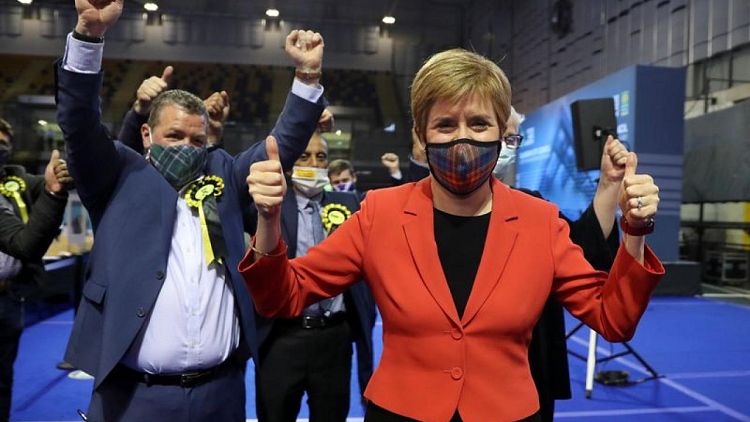By Natalie Thomas
GLASGOW (Reuters) -Scotland's main pro-independence party captured a swathe of seats on Friday in a crucial Scottish parliament election that could determine the future of the United Kingdom, although its leader cautioned the result remained "on a knife edge".
The SNP says it will seek to hold a new vote on secession by the end of 2023 if there is a pro-independence majority returned to the devolved 129-seat parliament - setting up a potential legal showdown with Prime Minister Boris Johnson, who says he will refuse any such vote.
The SNP won 27 of the first 30 seats so far declared, including taking East Lothian from Labour and Ayr from Johnson's Conservatives, two of the election's key battlegrounds.
However, in some areas there was an increase in support for opposition pro-union parties, indicating the final outcome would be very close, with some seats allocated on a separate proportional representation system.
"A majority has always been a very, very long shot," said Nicola Sturgeon, Scotland's First Minister and SNP leader, adding the electoral system for the devolved parliament, which was created in 1999, favoured smaller parties.
"It would be good to do. But I have never taken that for granted and it has always been on a knife edge. I am extremely happy and extremely confident that we are on track in the SNP for a fourth consecutive election victory," said Sturgeon, who retained her own seat with a comfortable majority.
When asked what it would mean if the SNP did win a majority, Johnson said he would wait and see what happened. "I don't think people want much more constitutional wrangling right now," he told reporters, echoing previous comments that it was wrong to focus on independence during the COVID-19 crisis.
The outcome of the election could ultimately put Scotland on the path towards breaking its 314-year union with England. Scotland's politics have been diverging from other parts of Britain, but Scots remain divided over the prospect of another polarising independence plebiscite.
Britain's exit from the European Union - a move opposed by an overwhelming majority in Scotland - a perception that the Scottish government has handled the COVID-19 crisis well, and antipathy to Johnson's Conservative government in Westminster have all bolstered support for the independence movement.
FRACTURED KINGDOM
Scots voted by 55%-45% in 2014 to remain part of the United Kingdom, in what pro-unionist parties say should be a once in a generation vote. Polls suggest the outcome of a second referendum would be too tight to call.
If there was another referendum and the Scots voted to leave, it would mark the biggest shock to the United Kingdom since Irish independence a century ago.
The SNP need to gain at least four more seats to win an overall majority of 65, but could rely on the backing of the pro-independence Green Party, which took five seats in 2016, to pursue a second vote.
Turnout across Scotland was higher than five years ago. Commentators said the SNP needed to get its supporters out to gain a majority, while it could also mean tactical voting by those opposed to breaking up the union.
Results from about two-thirds of the 73 constituency seats are due on Friday. The remainder and regional seats – allocated on a complicated proportional representation system based on a second vote – will be announced on Saturday.
All the parties say the outcome of the regional seats, few of which will be won by the SNP, will be crucial in whether there is a pro-independence majority.
(Writing by Michael Holden and Andrew MacAskill; Editing by Angus MacSwan, William Maclean and Alex Richardson)
